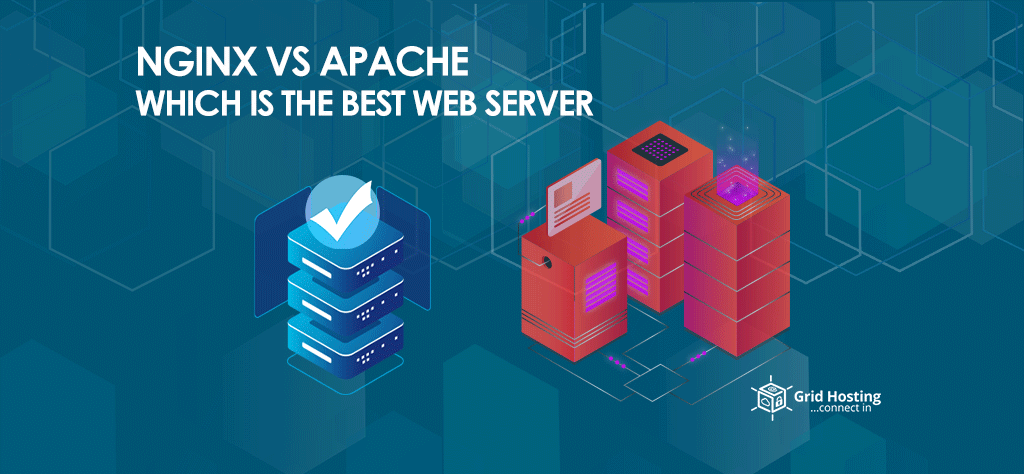There are multiple types of software servers these days for users. However, nothing is better when it comes to Nginx and Apache. Both are open source servers strengthening the world of the internet today. Approximately 60% of internet users relied on Apache until the introduction of Nginx. The rapid growth in data traffic and users of the internet resulted in several performance problems. There was an immediate need for another server to overcome these problems.
Nginx was introduced for the purpose and it was designed to work as a standalone web server for apache. Here users might wonder whom the best amongst all whether it is Nginx or Apache. Therefore, we are going to do a comparison of both to make things easy for you. The Nginx vs Apache will cover everything which you need to know.
Before getting straight to the comparison let, we have a little run down on both web servers.
Nginx
In the world of the internet, Nginx is an open-source solution that offers scalability and stability to its million users. The purpose of Nginx was to manage 5000-1000 connections instantly. It was quite essential back in 2004 when the web was expanding at a rapid pace. In addition to that, website owners and system administrators also prefer Nginx as it works great with static files earlier it was only known for its contribution to static files. With the passage of time, Nginx emerged as a complete web server handling the full spectrum of server tasks. It is also used as a reverse proxy, load balancer and mail proxy for HTTP (Hypertext Transfer Protocol) Caching.
Apache
A web server of old times most probably is as old as the World Wide Web is. Thousands of users have used apache as software since 1995. Which made it a dominant server among internet users including system administrators. The reason was apache offered smooth performance, and it was the only suitable option of that time.
Users will find built-in apache on all the Linux Disros, which makes it a solution for that operating system. Whereas, it utilizes a different architecture as compared to Nginx. Still, Apache is reliable as it ensures scalability of the power and great documentation.
Use Cases for Nginx and Apache
You have heard the famous saying ‘jack of all trades master of none here apache is a jack-of-all-trades as far as serving the website is concerned. It is like a mixed blessing as apache servers can do everything for the users. However, it is an invention of an old era when technology was not advanced. Here we can say that age is a factor between apache and Nginx. Although it does not matter in the modern day where we have Nginx which can meet the requirements of internet users. Apache is user-friendly, which allows you the easy configuration of the web servers for multiple apps, which includes shared hosting.
Contrary to that, the Nginx software base is mature having greater streaming in comparison with Apache. It works very well where the key elements are security and stability. You will see Nginx is not easy to configure as the other types, which means you will get less core access.
How famous Each Web Server is
Apache was a dominant web server for so many years, therefore, holding a bigger market share. Therefore, you will see huge support and integrations for Apache with fantastic documentation. Which helped in increasing the popularity of this web server in the world of the internet.
However, it does not mean the users do not use Nginx; this server software has a massive share in the market despite its invention after apache. Nginx experienced a slow growth after its introduction but over time, it gained dominance in the field of server technology.
If we look ahead the time tells us that users will start shifting over Nginx from apache. It provides a lot of what the website owners are looking for in a web server. However, the Lite speed web server is also growing rapidly which might give tough competition to the Nginx in coming years.
There is a lot more in this head-to-head comparison between Apache vs Nginx Besides popularity. Here we are going to see a technical breakdown of their features and functionality.
Features and Functionality
In this section, we will learn about the technical aspects of the two top-performing web servers Apache and Nginx. Through this information, you can easily select one for your own use.
Connectivity and request dealing
In the world of the internet, the core competency of a server lies in how efficiently it handles the connections. Therefore, connection handling is a key factor of discussion between people when it comes to Nginx vs Apache.
Nginx
Nginx is a modern-day invention, fully capable of dealing with multiple requests and processing them quickly. It creates worker processes to deal with incoming connections, which are often more than thousands. For instance, every single worker will listen carefully to further process the connections and events, adding them into a loop. Over there the server will process the event and eliminate it when it finishes. In addition, the flow of Nginx offers inherent scalability to the users.
Apache
Unlike Nginx Apache handles multiple requests one at a time through its multiple processing modules. A website owner will select a connection, which fully meets the requirements of the current task. Apache generates some child processors for every event that is processed with a signal connection at a time. If there are, more processors than available require you might find it tough to differentiate between Apache and Nginx.
Such incident is very rare in that apache has a higher number of requests than its processors. Moreover, its Multi-processor module is not able to scale well because of memory usage. Despite all these problems, a WordPress developer would still go for the MPM of apache. It also has MPM-worker and MPM-event modules. Both will help improve the smoothness of operation and scale better owing to the way they can spawn numerous processers per threat collection.
You Might Also Like to Read: Plesk vs cPanel: Which Control Panel is better?
Request dealing for static and dynamic Content
Before moving on, it is necessary to mention the static vs dynamic content for each server. You might have read that the Nginx server has no mechanism to process the dynamic content. It’s true to some extent which means Nginx can’t process it in a native way but it sends the content to an external processor and waits so it can return back before Nginx moves on to another content. A system admin will establish a solution for the development.
There are denials to such approaches namely on the performance. Whereas the advantages of performance overheads for every portion of the chain invalidate this. Nginx has not to need to be worried regarding the processing of requests so it can focus on areas that require responsibilities with efficiency.
The MPM system of Apache allows it to process both static and dynamic content without requiring further assistance from the modules. It attaches a language processor to every worker, which is a simple tactic, and it works great. In case you want to make a change, you can swap the modules with ease.
Serve Configuration
A visible difference between these two servers is the way you configure Nginx and Apache. When it comes to Nginx, a user cannot configure this server outside of the main file because of its centralized approach. You might consider it a disadvantage whereas there are many advantages of such an approach
- The administrator of the server has to take care of the security
- Centralized servers ensure smooth performance as compared to others
- Nginx would not have to check for the file configuration in each directory
In Apache, there are configuration files which the user can add anywhere as per his requirements. Apache will verify the elements of a path for a file when it receives a quest. It is suitable for anyone wanting to personalize the portion of the server. However, it might result in a disaster if any directive creates security problems. The main reason is a decentralized approach for which you might see Apache on the shared hosting. Which is the only reason WordPress performs well on the Apache servers.
Interpretation of received requests
There is an apparent difference in the way both Apache and Nginx interpret the received requests. In simple words, Nginx interprets the request through a uniform resource identifier (URI) for every component. On the other hand, Apache will do the same but it’s common to see a file-based path structure.
For Special discounts and offers, visit our official Facebook Page.







